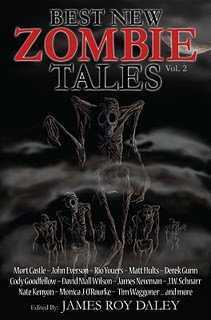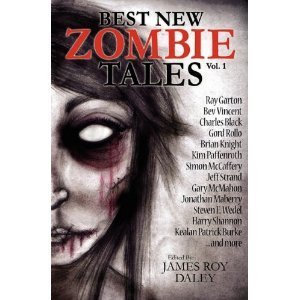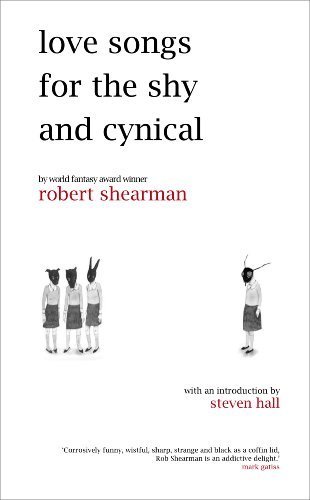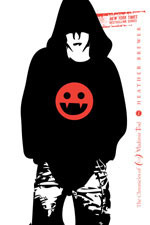Narrelle M. Harris's Blog, page 50
October 25, 2010
GaryView: Pride and Prejudice (1995 BBC TV series)
Gary: So. That's… good television, is it?
Lissa: Many consider it so.
Gary: But it's just all weird dresses and weirder hats, and everyone finding fancy ways of being obnoxious or stupid.
Lissa: Truly, is that all you garnered from it?
Gary: Why are you talking funny?
Lissa: There is nothing peculiar in my… oh god. Bugger. Sorry. I reread the book after I loaned you the DVD. The language kind of soaks into your skull after a bit. It's an easy rhythm to fall into. Did you really hate it that much?
Gary: I didn't hate it. It was boring, that's all. All those people pretending to be civil when they were just being mean. I had enough of that crap when I was alive, at school and … places. Even afterwards. There was this lecturer I had at uni, and he always managed to be so civil while being such a bastard I didn't usually work out what was going on until after everyone else was laughing at me.
Lissa: That's awful.
Gary: This was after… you know… and I'd gone back and was trying to keep up, and couldn't. So. You know. Shows about people being clever and mean aren't my thing.
Lissa: Oh. But… what about the romance?
Gary: What about it?
Lissa: Never mind.
Gary: Why do you like it so much?
Lissa: The language is beautiful. And it's not all about people using language cleverly just to be mean. It's also about how people can learn to change. And they can use language to be kind too. Elizabeth doesn't use it to be mean, though she is a bit snarky. But I like her snark.
Gary: Yeah. Her… snark… is cool. Reminds me of you a bit.
Lissa: The snark.
Gary: Yeah. Oh, and the being smart and determined and stuff.
Lissa: But the snark too.
Gary: … Did I say something wrong?
Lissa: No. I did say I admired Liz's snark, so it's a fair call. Fine then. Well, going back to the vampire-themed stuff we usually watch, then – which of the characters do you think would have made a good vampire?
Gary: Wickham. Without a doubt. Self centred prick.
Lissa: Not Darcy?
Gary: [derisive] God, no. He'd never survive the change. He's strong willed but basically he's kind and generous and all that stuff. He's not mean enough to change.
Lissa: Neither are you.
Gary: I'm no Darcy either.
Lissa…
Gary: Oh, and Mrs Bennett. She'd definitely make it.
Lissa: You know, I hadn't thought of that, but I bet you're right. Lady de Bourgh too. She's a harridan.
Gary: And then that idiot Collins would let her eat him.
Lissa: You may not have liked it, but you were paying attention.
*For newcomers, the GaryView is a review of books/films/TV/entertainment carried out as a conversation between Lissa Wilson (librarian) and Gary Hooper (vampire) , characters from my book 'The Opposite of Life'. Visit my website for more information.








October 23, 2010
GaryView: Tomorrow, In a Year by Hotel Pro Forma (Melbourne Festival 2010)
 Tomorrow, In a Year is an opera based on the work and life of Charles Darwin. It is performed by Danish art collective, Hotel Pro Forma, with music by Swedish electronic band, The Knife. It contains opera, dance, avant garde music, projections, smoke effects, laser light effects, Darwin's text 'written' in light on a screen, and very unconventional lyrics taken from Darwin's notes. I attended the performance courtesy of the Melbourne Festival; so
did my characters Gary and Lissa – here is what they thought:
Tomorrow, In a Year is an opera based on the work and life of Charles Darwin. It is performed by Danish art collective, Hotel Pro Forma, with music by Swedish electronic band, The Knife. It contains opera, dance, avant garde music, projections, smoke effects, laser light effects, Darwin's text 'written' in light on a screen, and very unconventional lyrics taken from Darwin's notes. I attended the performance courtesy of the Melbourne Festival; so
did my characters Gary and Lissa – here is what they thought:
Gary: I've never heard anyone sing about the fossil record before.
Lissa: Yes. It certainly was… unusual.
Gary: I might have listened to more of my grandad's opera collection as a kid if they'd been singing about science instead of consumption.
Lissa: You have a point.
Gary: Did you like it?
Lissa: I thought it was really interesting. That mezzo-soprano, Kristina Wahlin, had such a beautiful voice. The dancers were fascinating too. Graceful and strange. The music was weird. I admit I wasn't expecting you to like it.
Gary: Why did you invite me along then?
Lissa: When my boss gave me tickets to a show inspired by Darwin's On the Origin of Species, you were the very first person I thought of. I thought you might find it interesting, at least.
Gary: It was. People singing about carcasses and bones, larva and lava…
Lissa: Botany, biology and geology…
Gary: Yeah. It was cool.
Lissa: But I thought you might prefer more of a narrative structure. I had trouble getting into it to begin with. It's not telling a linear story so much as exploring themes.
Gary: It's not what I'm used to, but narratives don't always work for me anyway. Sometimes I find everyone's motivations confusing. Or stupid. This was more like… ah… sort of like science. Groups of ideas. Um… I don't think I'm saying this properly.
Lissa: Well, it was in four movements, the way classical music and operas are. So yes, you're right, they were themes rather than a linear narrative.
Gary: So the first bit was about Darwin's work, the fossil record and developing his theories.
Lissa: It was about a response of nature, I think. The second part was about his daughter's death. I think that was about organisms generally, how life is complex and how death is part of the process. [looks wryly at Gary] Normally.
Gary: I am dead. I'm just not… dead dead. Um. The third bit was about Darwin's book being published and the fourth was about the future.
Lissa: I think those parts represented exploring society as an organism and then society evolving too.
Gary: The last bit was about the interrelationship of all things and the relationship of man to the world around him.
Lissa:… that's a very good analysis!
Gary: It's what it says in the program.
Lissa: Oh!
Gary: The program explained a lot. I kept reading the notes during the performance to remind myself what it was supposed to be about every time it changed.
Lissa: In the dark?
Gary: [widens his eyes meaningfully at her]
Lissa: Oh that's right, super vampire vision. I forgot. Did those bright green lights outlining animals and leaves and stuff hurt your eyes?
Gary: Nah. I just squinted if it got too intense.
Lissa: What did you think of the music? And the dancing?
Gary: Everything's based on mathematics. You told me that. Art and dance and music and stuff. So I looked for the patterns. The patterns were kind of weird in this, but I could see them, now I know to look.
Lissa: So you really liked it then?
Gary: It was about Darwin and science, and built on maths. Of course I liked it.
Lissa: An opera about Darwin is an awesome idea, isn't it?
Gary: Though I wonder, sometimes, what he'd make of me and the whole… vampire thing.
Lissa: He'd probably make you his life's work and write a massive set of books about you.
Gary: Yeah. [Sighs]. Seems a shame we never got to meet, really.
Lissa: Yeah. I bet the look on his little face would have been priceless.
Gary: … his little face?
Lissa: Just an expression. Like the expression on your little face this very instant.
*For newcomers, the GaryView is a review of books/films/TV/entertainment carried out as a conversation between Lissa Wilson (librarian) and Gary Hooper (vampire) , characters from my book 'The Opposite of Life'. Visit my website for more information.








October 19, 2010
Bullying – how not to put up with it
Karen Healey, the author of the most excellent Guardian of the Dead, has posted recently about her experiences of bullying, and what we as individuals can do about it. I found it a moving piece, which reflected some of my own experiences as well.
Karen's blog is always interesting, often funny, sometimes moving, always smart. You should read her blog, and her books, anyway. But this blog especially – if you've ever been bullied, if you've never been bullied but you've seen it, if you're a parent or a teacher or a sibling or just an interested bystander. Maybe we can all take her excellent advice and make the world a little kinder and a little stronger.








October 13, 2010
Competition 8: The (untrue) origins of Halloween
 Halloween draws nigh. So do copies of Best New Zombie Tales Vol 2 containing my story The Truth About Brains.
Halloween draws nigh. So do copies of Best New Zombie Tales Vol 2 containing my story The Truth About Brains.
In honour of these two events I have a copy of Best New Zombie Tales Vol 2 to give away as first prize! Other prizes may follow, depending on the number of entries. One entry per person!
The comp? Invent a history of Halloween for me! Long or short, it doesn't matter. Post your answers here, at my Facebook page (under Discussions) or send them by email to narrelle (at) iwriter.com.au. Entries close November 3rd 2010!








October 12, 2010
Upcoming events – October and November
If you're looking for something to do at Halloween, the Continuum Convention folks are holding a fundraising quiz night. I'll be MCing the event! It's on Saturday 30 October from 8-10pm at the Brian Boru Function Room at the Celtic Club at 316/320 Queen St, Melbourne. Full details are on their Facebook Event Page.
I will also be in Perth from 6-16th November as the result of a spontaneous decision to visit a friend. I know it's short notice, but I am available for speaking engagements (for a reasonable fee). If you know of a library, club or school who would be interested, you can find out more about the three talks I give and my rates at my website.
Keep an eye out here at at my Facebook page for the confirmed Perth engagements in case you'd like to come along to a talk!








October 10, 2010
The Truth About Brains
 My short zombie story, The Truth About Brains, is now available!! It was published in the Canadian zombie anthology, Best New Zombie Tales (volume 2), edited by James Roy Daley.
My short zombie story, The Truth About Brains, is now available!! It was published in the Canadian zombie anthology, Best New Zombie Tales (volume 2), edited by James Roy Daley.
This is the story that begins:
"My little brother Dylan is dead, but that doesn't stop him from being a pest. He still follows me everywhere, and Mum still makes me take him with me when I go to the shops. It wouldn't be so bad, except he's always trying to bite people. He tried to bite me the first few days, but I hit him across the nose with a rolled up newspaper and he gave it up."
Those of you who came to my reading of the story at Continuum 5 know what the truth about brains really is, but the rest of you can find out by picking up the anthology as a paperback or a Kindle book from Amazon.com:
Best New Zombie Tales (Vol. 2) (Paperback)
(Paperback)
Best New Zombie Tales (vol. 2) (Kindle)
(Kindle)
 You can also, of course, get Volume One, jam packed full of entertaining stories of the undead:
You can also, of course, get Volume One, jam packed full of entertaining stories of the undead:
Best New Zombie Tales (Vol. 1) (Paperback)
(Paperback)
Best New Zombie Tales, Vol. 1 (Kindle)
(Kindle)
Both books are also available as e-books at Smashwords!
And if any Australian booksellers out there want to stock either book, they are distributed via Ingram Content Group.








October 6, 2010
Review: Love Songs for the Shy and Cynical by Robert Shearman
 Many people met Robert Shearman at Aussiecon 4 in September, and we bandied about words like 'funny' and 'adorable' and 'wicked'. Well, I bandied them at any rate. And Rob Shearman is all those things. He is also sharp, smart and extraordinarily gifted.
Many people met Robert Shearman at Aussiecon 4 in September, and we bandied about words like 'funny' and 'adorable' and 'wicked'. Well, I bandied them at any rate. And Rob Shearman is all those things. He is also sharp, smart and extraordinarily gifted.
I picked up Love Songs for the Shy and Cynical because I like Rob Shearman, I liked his Dr Who episode, 'Dalek', and the strangely dark story Road Kill that was published by Twelfth Planet Press. I had just appeared on an Aussiecon panel with him about SF and Theatre, too. I wanted to find out more about his work. John Richards (of Boxcutters) had read the collection of short stories and said that they were bleak. Rob insisted that they were funny.
I've read the whole collection now. It turns out that John and Rob are both correct.
Love Songs for the Shy and Cynical is a collection of short stories about love. Not about happy-clappy, soppy, head-over-heels love – but about what love is, and isn't. It's about what love does to us, and how it hurts us, and how we are afraid of it. Ultimately, it's also about love's potential, and how it can be sublime as well as all those other things.
Some of the stories are indeed very funny. The opening tale, Love Among the Lobelias, explores what happens when the Devil launches his writing career. His attempts to explore his softer side have unintended consequences and it seems that there are people in the world more evil than the Prince of Darkness. 14.2 is another darkly funny tale and a warning about attempts to measure or quantify love.
There are very dark, bleak and bitter stories too. There are tragedies and horror stories. Be of Good Cheer, about a woman who suffers physical pain when other people are happy, and so the man who loves her keeps himself miserable for her sake, reminded me so strongly of people that I know that I found it devastating.
Among the tales of bleakness and darkness, there are gentle, sweet stories too, like Love in a Time of Sharing, and forgiving stories, like Luxembourg.
Towards the end, Not About Love becomes surreally metatextual. It's a story about this collection of stories, where the dark subjects within are criticised by Shearman's own family. It's like he's answering the critics already about what he thinks of love, and his own apparent cynicism on the subject. This leads into One Last Love Song, which is as uneasy and complicated as all the rest, but is also a statement about the transcedence of love without being in the slightest bit mawkish or sentimental.
Robert Shearman very much deserves the awards he has been gathering for Love Songs for the Shy and Cynical – which include a British Fantasy Award for Best Collection. He won in the same category for the Shirley Jackson Awards. His love stories are not always easy reading. Even the funny ones are full of humanity being fragile, cruel or selfish. But there is also kindness and, yes, love.
Love is complex and sometimes twisted, and it's a joy (and a heartbreak) to read a collection of stories about love which manages to be both knowing and forgiving of all humanity's flaws.
You can read more about Robert Shearman, or just head on over to Big Finish or Amazon.co.uk to buy a copy. Do it now while the Australian dollar is in good health against the pound! (I can't find an Australian online bookseller that has it in stock!)








October 5, 2010
Lessons in language: Tactfully changing tack
Some things have been jarring me lately. Jarring me until my teeth ache. So please excuse me while I have a language rant.
I love language. I love learning new words and phrases, and I love discovering how those phrases came to be. Etymology – the account of how words and phrases originated – is of endless fascination to me.
And because I love language, when I see errors in language written by novelists and journalists, I seem to suffer actual physical pain. It hurts me when people haven't the faintest idea how to use an apostrophe, or how to spell 'definite', or that there is a difference between a 'magic bullet' and a 'silver bullet' when talking about problem solving.
I'm not talking about errors made by your average Joe/Jo in the street, or in casual communications. Friends writing emails aren't necessarily professional writers and shouldn't be held to the same standards. Even for writers – well, typos happen to the best of us. But there is a difference between an obvious typo, and when a writer (or their editor) clearly doesn't know their grammar/vocabulary/punctuation.
My big gripe at the moment is the phrase 'changing tact', to indicate a change of approach to a problem.
The expression is actually 'changing tack'. Etymologically, the phrase is derived from the nautical term 'to tack'. When ships tack, they change course relative to the direction of the wind – zig-zagging against the wind to move forward.
Knowing the origin of the phrase makes it easier to remember how to spell it. In context of its origin, the spelling makes perfect sense. Using the word 'tact' makes no sense to me at all. I'm sure being sensitive and diplomatic (showing tact) is important in problem solving, but you can't change that kind of tact. Or do people think it is related to the word 'tactic'?
I know that English doesn't always seem to make a lot of sense – although, once etymology is understood it does make better sense. That's what you get with a language that has been built out of a half dozen other languages – Latin and Celtic, Norman French and Saxon German, the language of the Vikings, everything that's been borrowed from Arabic, Russian, Hindi and more.
The incorrect use of the word 'tact' in this phrase indicates to me that the people using it have never seen it written down. They've heard – or rather misheard – the phrase and are just having a stab at how it should be written. This happens a lot with other phrases and spelling. People write 'tow the line' instead of 'toe the line' all the time; or 'should of' instead of 'should've' (the contraction of 'should have'). The number of times I've seen 'flaut' and 'flaunt' (which have completely different meanings) confused in print gives me a toothache.
The thing is, I don't have a university degree in language (or in anything else, come to that). The reason I have a wide vocabulary and an understanding of grammar and punctuation is essentially because I read. Voraciously. I read biographies and histories. I read SF and crime. I read trashy thrillers and Booker Prize winners. I read classics from the 19th century and new writers from the 21st. I read children's books and adult fiction. I read newspapers and magazines. I read the back of the box. I read for fun and education. I read. All the time.
When I come across a word or phrase I don't understand, and can't work out from its context in the story, I look it up. I teach myself new language.
If you're a writer, you should be reading. You should be noting words and phrases and exploring anything that is new, to add to your writer's language toolbox.
But most of all, you should be writing 'change tack' instead of 'change tact'.
Please. I and my aching teeth will thank you for it.








September 28, 2010
Review: A Study in Scarlet (A Study of…) by Vicious Fish Theatre
I remember discovering the stories of Sherlock Holmes. After years of being familiar with the character through films, pastiches and pop culture references, I sat down to watch the Jeremy Brett TV series in the 1990s. It was so unlike the character as portrayed elsewhere that I was intrigued. This Holmes was not kindly and avuncular, but sharp and difficult. His Watson was an active everyman, not a fat, bumbling dimwit. Intrigued, I turned to the source material, and was instantly hooked. I still reread the books and short stories regularly.
Robert Lloyd came to Sherlock Holmes much earlier than me, though the impact was no less profound. Holmes has been Lloyd's hero since the lanky actor was 12 years old. The culmination of the literary love affair is "A Study in Scarlet (A Study of…)". Lloyd re-enacts the first ever Holmes novel by Sir Arthur Conan Doyle, recreating key scenes from A Study in Scarlet. The story is interspersed with Lloyd's comments on how he discovered the Great Detective, elements of the story he finds peculiar or amazing, and (particularly in the awkward latter half of the book) inspired suggestions for casting the wild west adventure part of the narrative.
Lloyd portrays all the characters of the book with deft shifts in posture and voice, so you're never confused about who's speaking. It's an enthusiastic rather than subtle retelling, but the key plot points are all there and you are rushed along with the story.
Lloyd's obvious affection and enthusiasm for Holmes is infectious, and it's that passion that makes this show so enjoyable. The conspiratorial asides and gleeful observations pull the show together. It's charming and wonderful to see literature praised so joyfully on stage, and the story re-enacted so colourfully. The effects are simple and sparing, using projections and lighting, and all the more effective as a result.
As someone who already loves the Sherlock Holmes stories, I enjoyed this production immensely. Its energy, sense of fun and clear love of the books communicates as a fresh approach to a character that many people think they already know. My hope is that others who only know Holmes through his much-diluted form in popular culture will see this, be infected by that passion, and go to the source, just as the show's director, Scott Gooding, did.
A Study in Scarlet (A Study of…) is on at Son of Loft, The Lithuanian Club, 44 Errol Street, North Melbourne until Friday 1 October. Tickets online from the Melbourne Fringe website.








September 27, 2010
GaryView: The Chronicles of Vladimir Tod Book 1- Eighth Grade Bites by Heather Brewer
 Lissa: Vladimir Tod reminds me of you!
Lissa: Vladimir Tod reminds me of you!
Gary: A friendless, nerdy kid who's beaten up by bullies and is clueless with girls?
Lissa: No! Dope. I mean a kid trying to find out the rules of vampirism who watches a lot of vampire films and doesn't eat people.
Gary: Oh.
Lissa: And you're not friendless.
Gary: I have one friend. And Vladimir Tod has one friend.
Lissa: You're in a mood today. If you're not careful I'll have to give you a hug.
Gary: (looks at her)
 Lissa: (pounces and gives him a hug)
Lissa: (pounces and gives him a hug)
Gary: Sorry.
Lissa: You don't ever have to be sorry for feeling low. Life's like that, sometimes.
Gary: So's undeadness.
Lissa: Wanna talk about it?
Gary: … No… Yes… Um… Maybe I identified with him a bit. Except I was really good at maths and not so good at English. And I wasn't a vampire in high school, just uncool.
Lissa: Most of us are uncool at school, and those that are cool, well they're just faking it.
Gary: I guess.
Lissa: Trust me. And I think you're neat.
Gary: I think you're pretty neat too.
Lissa: Vlad's pretty cool in the end, too. He learns from his experiences.
Gary: All the stuff about discovering his past and trying to work out what's going on when he hasn't any data was ok. Some of the story happens a bit too quickly.
Lissa: It does feel rushed at times. It reminded me of Harry Potter sometimes too, doing the whole school year and having a weird teacher. I thought the characterisation was a bit light-on.
Gary: True. I liked his guardian, Nelly, but I wish there'd been more about her. His mate Henry too. And I didn't get why Vlad liked Meredith so much. She was kind of …
Lissa: … Wet? Vapid?
Gary: No real personality. I always liked smart girls with a bit of character. Who laughed at me.
Lissa: Are you angling for another hug?
Gary: (laughs) No.
Lissa: Cos there's plenty where that came from.
Gary: I'm aware of that.
Lissa: (grins) You haven't yet had your usual rant about the inaccuracy of the vampire lore.
Gary: You know the drill. Some of it is fine, some of it is ridiculous. I wish the levitating bit was true. That would be handy. Especially when I've just washed the floor.
Lissa: They never write about vampires doing housework, have you noticed?
Gary: Even creatures of the night need a tidy house.
Lissa: (bunging on a bad Transylvanian accent) "I must go a wreak havoc in ze mortal vorld, but firrrst I must dust my bric a brac…"
Gary: "…und vipe ze vindows…"
Lissa: (giggles)
Gary: Just because I'm undead, it doesn't mean I like grime.
Lissa: Doesn't mean you don't like hugs either.
Gary: …
Lissa: (pounces and hugs him again)
Buy Eighth Grade Bites (Chronicles of Vladimir Tod, Book 1) at Amazon.com
at Amazon.com











